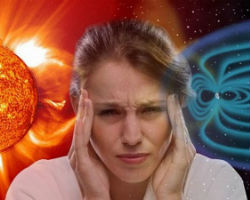How Does the Weather Affect Your Health?

Some people who travel quite often have to go through time and climate zones and feel no ill effects. Others, to the contrary, even when they are lying on the sofa at home, can feel the slightest changes in the atmospheric temperature and pressure which results in feeling unwell and tired. Such sensibility to changes of weather conditions is called ‘weather sensitivity’ or ‘meteosensitivity’.
Weather-sensitive people, or, as they are often called, human ‘barometers’, are mostly those who suffer from joint diseases or cardiovascular disorders, those who often work long hours, those who have not enough rest and overwork themselves. Such groups of people include patients with the heart, brain or lower extremities atherosclerosis, patients with respiratory or musculoskeletal diseases, highly allergic individuals and those who have neurasthenia. So there is no doubt that weather does affect human health. There is even a certain field of science called biometeorology which studies the interactions between living organisms and the processes happening in the atmosphere.
How can drops in atmospheric pressure affect the way a person feels?

According to some medical experts, atmospheric (air) pressure should be 760 mmHg (torr) for a person to feel well. But if air pressure deviates at least for 10 mmHg, either to 750 mmHg or to 770 mmHg, it can influence a person’s health and the way he or she feels.
A drop in air pressure is accompanied by a decrease in the amount of oxygen in the air and an increase in air humidity, which raises the probability of precipitation and a rise in air temperature. All of this causes a decrease in a person's blood pressure and blood flow velocity. People who have low blood pressure (hypotensive patients) as well as cardiac and respiratory patients, are the first to feel drops in atmospheric pressure. These people often experience general weakness, a short and quick breath, air hunger and breathlessness, and/or ischemic pains. On the contrary however, such weather may make hypertensive patients feel better due to a decrease in blood pressure, and only growing hypoxia will cause sleepiness, fatigue, breathlessness and heart pains which the hypotensive patients feel in this weather. Such change in air pressure is felt most acutely and painfully by those having high intracranial pressure. They often face a worsening of migraine attacks. As well, a person may feel discomfort in the intestines and belly due to increased gas production.
Here are some tips that can help you cope with these unpleasant symptoms:
- It is very important to normalize your blood pressure and maintain it at its usual (normal for you) level.
- Drink a lot of fluids – green tea with honey can be beneficial.
- Do not give up your morning coffee during this period.
- Try ginseng or eleutherococcus tinctures.
- Have a contrast shower after your working day.
- Go to bed earlier than usual.
What happens when there is an increase in atmospheric pressure?
When atmospheric pressure increases, the weather becomes clear and there are no sharp changes in air humidity and temperature resulting in an increased amount of oxygen in the air. An increase in atmospheric pressure causes hypertensive patients to feel unwell as they face high blood pressure and increased blood flow velocity. Highly allergic individuals and patients with bronchial asthma are negatively affected by such weather as well. Hypotensive people may feel well and even experience a surge of energy.
When the weather becomes windless, the concentration of harmful pollutants, which are irritants to people with respiratory diseases, increases in urban air. Another negative characteristic of high atmospheric pressure is a decrease in immunity. This is because an increase in air pressure reduces the number of leukocytes in the blood and the body becomes more vulnerable to various infections.
Tips to cope with the unpleasant effects of increased atmospheric pressure are as follows:
- Take a contrast shower.
- Breakfast should contain more potassium (bananas, raisins, dried apricots, cottage cheese).
- Do not overeat during the day.
- If you have increased intracranial pressure, take the medications prescribed by your neurologist beforehand.
- Do not start any important things on this day – take care of your nervous and immune system.
- Try to spend your day having as little physical and emotional activity as possible.
- When you come home from work, get some rest for at least 40 minutes, then do your daily routine and try to go to bed earlier.
How do magnetic storms influence human health?

Magnetic storms are quick and sharp changes in the Earth’s magnetic field occurring in the period of increased solar activity. Such changes have certain influences on humans – magnetic storms disturb the function of cardiovascular and gastrointestinal systems, during this period the reactions of the central nervous system are slowed and the capacity for work is reduced.
People with coronary heart disease suffer from the aggravation of their condition during the days of magnetic storms more often than on ordinary days (up to 50-55% more often). About 25-27% of angina attacks happen on the eve of these days, the same number of attacks happen the day after the storm is over. Some weather-sensitive people may experience the feeling of anxiety and depression, mental tension, irritability and insomnia. Electromagnetic waves can change the viscosity of blood - the blood becomes thicker, it flows more slowly through the vessels, and especially through the thin vessels of the brain, the cells do not get enough oxygen which results in headaches, migraines, fatigue, sleepiness and sluggishness. The regulation of the vascular tone is also disturbed causing unpredictable changes in blood pressure. That is why people who are most sensitive to magnetic storms are those with cardiovascular diseases.
In the periods of geomagnetic activity, the following tips are recommended:
- Magnetic storms promote an increase in the level of cholesterol in the blood; therefore, it is better to not eat foods rich in calories (like desserts or fatty foods) choosing instead vegetables, fruit, boiled fish, porridge and rye bread. Daily caloric content of your food should be reduced approximately by 1/3 (not more than 2000 kcal per day).
- Avoid excess physical activity and do not overwork.
- Those who are predisposed to heart disorders should have their medications close at hand and thoroughly follow the recommendations given by their cardiologist.
- Try to avoid alcoholic beverages.
- You should not get out of bed too fast in the morning – it may provoke sudden fainting or severe dizziness. This is particularly important for those who take medication for low blood pressure.
- Contrast shower can be very beneficial for your vessels, but if you haven’t practiced it before, then you should start gradually. First, take a nice warm and a bit hotter shower, then in a week use a bit cooler and warm water, raising and lowering the temperature by several degrees.
- If you have any chronic diseases, try to notice when you feel unwell before, during and after a magnetic storm. After discussing it with your doctor, take additional medications during these periods or increase the dose of those that you’re already taking if prescribed to do so.
Have contrast showers;In order to reduce weather-sensitivity it is beneficial to:
- Swim;
- Walk and jog in the fresh air;
- Stick to a healthy and balanced diet;
- Have enough sleep;
- Take enough vitamins;
- Give up bad habits;
- Normalize your weight;
- Learn stress management and how to control your emotions (yoga, massage, therapeutic counseling, etc.)









